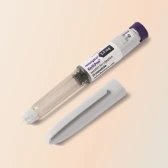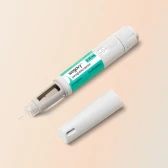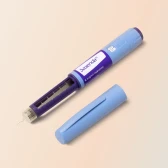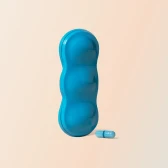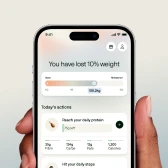If your T dips too low, you might decide to top up your levels via testosterone replacement therapy (TRT). But once you start, do you have to stay on TRT forever?
TRT is designed as a lifelong treatment. If you come off it, your testosterone will eventually go back to what it was before. Here’s what to know.
Key takeaways
- TRT is meant to be taken for life but it’s possible to stop safely
- If you stop, your testosterone will eventually revert to pre-treatment levels
- It’s best to come off TRT gradually, following a clinician’s advice

What happens when you stop taking testosterone?
The effects of TRT will wear off gradually.
For most types of TRT, it takes at least a week for half a dose to leave your system. But it can be months before your body recovers from its effects and your T returns to pre-treatment levels.
TRT suppresses your body’s natural T and sperm production, and it could take up to 12 months or more for these functions to be restored.
Good to know: how quickly you recover can be influenced by your age and how long you were on TRT.
1-4 weeks after stopping TRT
You might experience TRT withdrawal symptoms around 2-3 weeks after you take your last dose. This could feel like more pronounced low T symptoms, including fatigue and low mood.
These symptoms may ease as your body starts to produce its own T again. But remember that your levels will return to what they were pre-treatment, so they will still be low overall.
If you do need to come off TRT, we offer a dedicated treatment plan that helps stimulate your body to restart its own T production—and reduce withdrawal symptoms.
1-3 months
For some, total testosterone and erectile function return to pre-treatment levels after about 3 months off TRT.
Though it’s possible to still feel the positive effects of TRT on sexual function 6 and 12 weeks after your final dose.
After 6 months
It’s estimated that over half of men (67%) will have recovered normal sperm production by the 6-month mark.
By now, the effects of TRT should be fading. One study of older men found that TRT’s effects on body composition, muscle strength and quality of life had worn off six months after stopping treatment.
After 1 year
Reproductive function gradually recovers over about 15 months. After a year, sperm production should return to normal in most men (90%). Though this can take up to two years.
Also, it takes about 8 months for the hormones LH and FSH (which both support fertility and natural testosterone production) to revert to pre-TRT levels.
What should I take when coming off testosterone?
So, is there anything else you should take while transitioning off TRT?
At Voy, we recommend a combination of medicines that help restore natural T production.
Keeping up your strength training might also help ease the decline in T levels. Though this won’t maintain the results that are possible on TRT.
How long after stopping testosterone do levels return to normal?
It really depends. If you’ve used TRT for a long time or are older, it can take more time for your natural T production to resume. Besides, everyone’s different and responds to medicine in their own way.
You could see recovery within 12 weeks, though for some men it may take up to 12-24 months.
Coming off TRT: safe ways to stop
Don’t come off TRT cold turkey. It can lead to a sharper dip in your T levels, which may bring on symptoms.
Instead, speak with your provider. They’ll help you come off the medicine gradually so the transition is as smooth as possible. At Voy, here’s how that goes:
- We’ll taper you off testosterone by gradually reducing your dose
- In the meantime, we’ll put you on an 8-week schedule of medicines that will help your body re-start its own T production
Our clinical team will be on hand to guide you and monitor your progress. We would consider you recovered when your T, LSH, and FH have returned to their pre-treatment levels, and we normally recommend checking this 3 months after taking the last dose.
If you continue to have low T symptoms 3-6 months after coming off testosterone replacement therapy, we recommend getting a blood test to see whether anything else might be going on.
When it makes sense to try stopping TRT (and when it doesn’t)
Whether you’re coming off TRT after 6 months, a year, or longer, there’s plenty of reasons for making the call.
Treatment isn’t working
If all other factors affecting testosterone are under control—like stress, alcohol, diet and sleep—and you aren’t seeing much benefit from TRT, your provider may suggest stopping.
Here, your symptoms may be due to something other than low T.
Side effects
It’s rare, but some men develop serious side effects while using TRT. If the risks of TRT outweigh the benefits, your provider will likely recommend stopping.
You want to start a family
You might not have wanted to start a family when you went on TRT, but plans change. As a refresher: TRT affects your fertility by suppressing sperm production.
So, your provider might suggest switching to a different low T medicine that preserves your sperm count (like Clomid).
When doesn’t it make sense to stop TRT?
Of course, you can choose to come off TRT at any time. But in the medical world, the rule of thumb is: if the benefit of the treatment outweighs the risks (or negatives), it’s usually worth sticking with.
If your symptoms are improving, if you feel like you have more energy, or if you just generally feel like a better version of yourself on TRT—staying on it might be a good idea. Check in with your provider if you aren’t sure.
Take our quiz and at-home testosterone blood test to see if TRT is a fit for you. Our clinicians will assess your results and get you on the right treatment.


